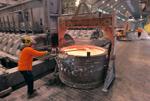Bryce Gray
,
Alyse Pfeil
JEFFERSON CITY — A state lawmaker is looking to save a key U.S. aluminum smelter, long plagued by financial and environmental woes, after the plant announced this week that it would close down, risking about 450 jobs.
House Minority Leader Crystal Quade, a Springfield Democrat, said on Thursday that she has filed legislation that aims to provide cheaper electricity to the southeast Missouri aluminum smelter — one of just five left in the country — and also looks to help owner Magnitude 7 Metals find a new buyer for the plant.
“Lawmakers have a responsibility to those citizens to attract and encourage a business to come to this state to save these jobs,” Quade, who is running for governor, said in a statement Thursday.
A glowing red hot anode is pulled out of a pot where aluminum is smelted at the Noranda aluminum smelting plant in New Madrid, Mo. on Thursday, May 1, 2014.
Aluminum production takes enormous amounts of energy. “People describe aluminum as electricity solidified,” said Annie Sartor, aluminum campaign director at environmental policy group Industrious Labs.
Magnitude 7’s existing energy supplier now provides energy to the smelter generated almost entirely from burning coal, Quade said. Her bill would allow the supplier to diversify its energy sources. The bill would also allow an energy company to create renewable energy on-site.
Magnitude 7, known as Mag 7, did not respond to a request seeking comment.
But the company told employees Wednesday that the smelter, in New Madrid County, would close down over the next three to five days, and that “most employees will no longer be required after January 28,” according to a report in the commodities publication Fastmarkets.
The news spurred interest from renewable energy advocates and electricity experts, who see a potential to shift Mag 7 away from coal-fired power.

Light reflects off of aluminum spilled on the production line at the Noranda aluminum smelting plant in New Madrid, Mo. on Thursday, May 1, 2014.
The Mag 7 plant is the largest single consumer of energy in Missouri — using about as much electricity as Springfield, the state’s third-largest city. Under previous ownership, the plant had purchased its power from Ameren and accounted for about 10% of the St. Louis-based electric utility’s sales.
Globally, aluminum smelting accounts for about 3% of all direct industrial carbon emissions, according to the International Energy Agency.
And with coal no longer the cheapest energy source, aluminum plants like Mag 7 are left hustling to find cheaper power.
“We’re facing a crisis,” said Sartor, from Industrious Labs.
That leaves Quade and others hoping to help the facility transition to cheaper energy sources. Currently, the plant relies on electricity from coal, which dominates Missouri’s power grid. For years, the state has burned more coal for electricity than any except Texas, according to government data.
The loss of the plant would continue the decades-long erosion of the U.S. aluminum industry. Up until about two decades ago, the U.S. had been the world’s leading aluminum producer. Today it only accounts for a sliver of production.
Quade and various advocacy groups are arguing that the U.S. must maintain domestic suppliers of aluminum. The metal plays a crucial role in many types of manufacturing, and the loss of plants may have national security implications, thanks to its use in military aircraft, for example.
“We’re losing about 20% of domestic capacity, which is just huge,” Sartor said of Mag 7’s impending closure. “And a lot of jobs, too — especially for that region.”
Mag 7 purchased the New Madrid plant in 2018 amid the bankruptcy of former owner Noranda Corp., after the company faced years of challenges at the site — often tied to energy costs.
In early 2016, Noranda sought a “legislative solution” to “secure a substantially more sustainable power rate for the smelter,” as it braced for curtailing operations and laying off nearly 500 of the 850 workers it employed at the time. Within months, Noranda filed for bankruptcy protection and idled the plant, before looking to sell off the smelter.
The plant reopened under its new owners in 2018, after reaching a deal with Springfield-based Associated Electric Cooperative Inc., as its power provider. The plant pays about $55 million per year to AECI for its energy costs, according to Quade.
Quade said Thursday that renewable energy advocates Renew Missouri contacted her a few months ago about a possible closure of the smelter and for help securing a meeting with Gov. Mike Parson’s team.
“The conversation really was, ‘How can we help keep the plant open?’” she said. “And obviously the biggest challenge they were alluding to was the high energy costs.”
In November, the company met with Quade’s chief of staff, the governor’s legislative budget director and the Missouri Department of Economic Development director.
Parson said at an event on Thursday, however, that when government partners with businesses, it has to be a good deal for taxpayers. “We’re not gonna bail anybody out of anything,” Parson said.
“But,” he continued, “we’re a long way from that at this point.”







View life in St. Louis through the Post-Dispatch photographers’ lenses.
The business news you need
Get the latest local business news delivered FREE to your inbox weekly.
